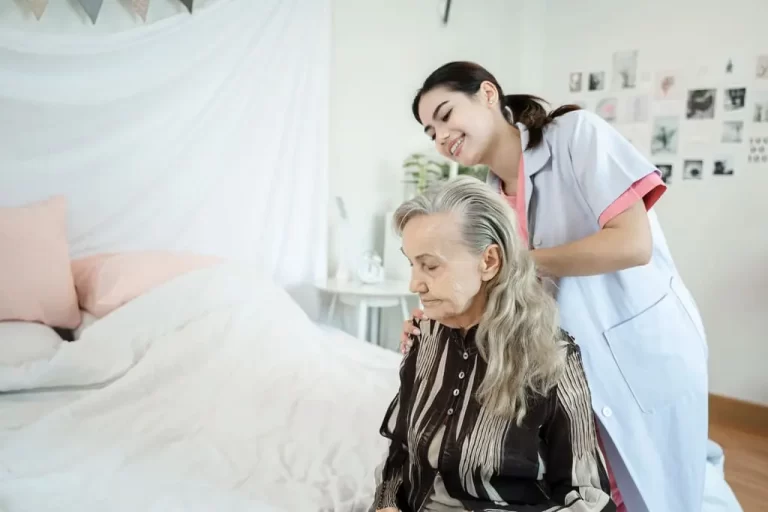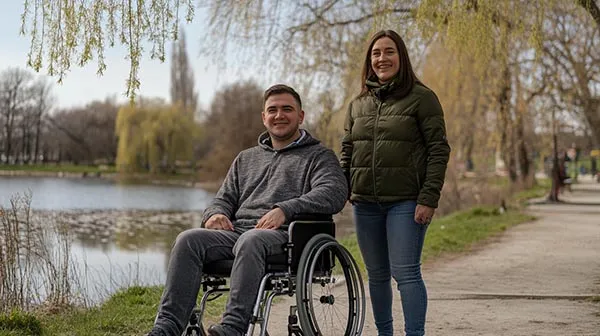What Recruiters Look for in Candidates
It’s important to consider the recruiter’s perspective when preparing for an interview so you can understand the core qualities and traits they seek. Focusing on what a recruiter needs, as well as what you can offer, will give you a competitive advantage.
Recruiters are keen to find candidates who possess a blend of essential qualities and skills that demonstrate their ability to provide exceptional care. Displaying high levels of empathy and compassion is imperative, as it reflects a good nature and a natural ability to resonate with people’s experiences. Supported individuals need to feel genuinely cared for, which involves a holistic understanding of personhood and our collective human rights. Strong communication skills are also important and are often listed in the job description. Care workers must effectively communicate with the people they support, discussing their needs, preferences and concerns. It’s also an important skill for co-producing care plans and working alongside multidisciplinary teams, ensuring everyone is on the same page while acting as an avid advocate for your client’s health.
While softer skills are important, technical knowledge and education are necessary for the role. Not every caregiving job requires formal education, but there is an exception for continuous learning and gaining qualifications, such as basic first aid training, safeguarding policies, and administering medication. For roles that require relevant experience in the care industry, you must reflect on your past care assistant jobs and find examples of delivering care, including how you made a positive impact and overcame challenges. Ultimately, a recruiter needs to trust that you have the ability to provide effective and compassionate care, as they have a duty to safeguard the people they serve.

Common Care Assistant Interview Questions and Possible Answers
In a care assistant interview, you should be prepared to encounter a range of questions designed to assess your suitability for the role. These questions serve multiple purposes, including evaluating experience and assessing knowledge.
Candidates should approach each question with a clear understanding of its underlying purpose and tailor their responses accordingly.
Q: Why Do You Want to Work as a Care Assistant?
Recruiters want to know your reasoning for becoming a care assistant. You must show appropriate motivations for wanting to work with vulnerable individuals and explain why you took this vocational path.
It’s always good to be honest and explain your story. You may have a caring nature and want to transform people’s lives for the better. Or, perhaps you have a unique lived experience which inspired you to help others. Be sincere, and explain why becoming a care worker is important to you.
Q: What Types of Specific Care Might You Provide?
There’s a vast range of duties involved in caregiving. Recruiters aim to measure your knowledge and expect a thorough understanding of the care provided. If it’s for a specific role, tailor your responses thoughtfully.
With that said, candidates should highlight their proficiency in various aspects of care, including assisting with activities of daily living, personal care, medication management, and mobility assistance. Emotional support is also essential, and candidates should showcase their capacity to offer companionship, actively listening to concerns and providing reassurance.
Q: How Do You Help a Client Maintain Dignity While Receiving Personal Care?
Maintaining a person’s dignity while providing personal care is necessary for protecting their human rights. Personal care duties, such as bathing, dressing, toileting, and grooming, are immense responsibilities. Recruiters need to assess that candidates can provide thoughtful and compassionate care.
To respond to these interview questions, candidates can explain how they establish respectful communication, involve individuals in decision-making, and seek their consent before proceeding with any care tasks. It’s also important to show an understanding of person-centred care, which puts the needs of supported individuals first and seeks to understand their preferences and needs.
Q: Are You Familiar with Safeguarding?
Recruiters commonly ask this question to assess the candidate’s understanding of safeguarding principles and ability to ensure the safety and well-being of vulnerable people under their care.
A thoughtful sample answer would demonstrate knowledge of safeguarding policies and procedures, including recognising signs of abuse or neglect, reporting concerns appropriately, and working collaboratively with other professionals to safeguard individuals effectively. Mentioning commitment to upholding ethical standards, maintaining confidentiality, and advocating for rights can also demonstrate a thorough understanding of social care principles.
Q: How Would You Handle An Upset Or Confused Individual?
These interview questions aim to evaluate the candidate’s ability to effectively manage challenging situations with empathy and professionalism. It’s common for supported individuals to experience behaviours of distress, and caregivers need to be equipped with strategies to address these situations calmly.
When responding, it’s important to discuss person-centred principles and emphasise an ability to communicate effectively, validate emotions, and use de-escalation techniques to help the individual regain a sense of calm and security. If you have direct experience as a care worker, you can include a personal story about your previous experience that led to a positive outcome.
Duties of a Care Assistant
The primary responsibility of a care assistant is to provide compassionate and personalised care that promotes independence, comfort, and overall quality of life. The duties differ depending on the specific care assistant job and the unique requirements of supported individuals. With that said, common duties include assisting with personal care, daily life activities and mobility support. Care assistants also offer emotional support and companionship, fostering meaningful relationships and addressing social and emotional needs.
Examples of care assistant duties include:
- Personal care
- Daily living activities
- Mobilby support
- Companionship
- Social and community integration
- Medication management
- Safeguarding
- Collaborating with healthcare professionals
Care assistants act as advocates for the people they support, protecting their human rights and ensuring their needs, preferences and values are respected.
Conclusion
The interview provides a platform for candidates to showcase their qualifications, skills, and personal attributes relevant to the caregiving role. Likewise, it allows the interviewers to evaluate candidates’ suitability for the position based on their responses, demeanour, and overall fit within the organisation’s culture. A potential employer has a duty to safeguard the people they support and ensure their teams are skilled, compassionate and committed to delivering exceptional care. It’s vital to prepare for the interview and show recruiters your dedication to the role and how you can transform the lives of the people they support.
During the interview, candidates can expect questions that delve into their motivations for pursuing a career in caregiving, their experiences in similar roles, and their strategy for handling challenging situations. Candidates who approach the interview with confidence, preparedness, and authenticity are more likely to leave a positive impression and increase their chances of securing the job position.
Join Nurseline Healthcare
At Nurseline Healthcare, we understand the extraordinary daily efforts of our clinicians, and we avidly support them in delivering proactive and compassionate care.
Through providing a range of training courses, we strengthen our clinicians’ knowledge and help them grow as individuals, fostering their skills and ability to provide humanised care. Our organisation delivers effective staffing solutions across the UK, supporting individuals with complex care needs, crisis situations or transitioning into the community. We believe that our clinicians are central to this mission, and we are dedicated to supporting their wellness and skills development throughout their careers.
If you are a clinician committed to delivering person-centred care, contact Nurseline Healthcare today and begin your care journey.







